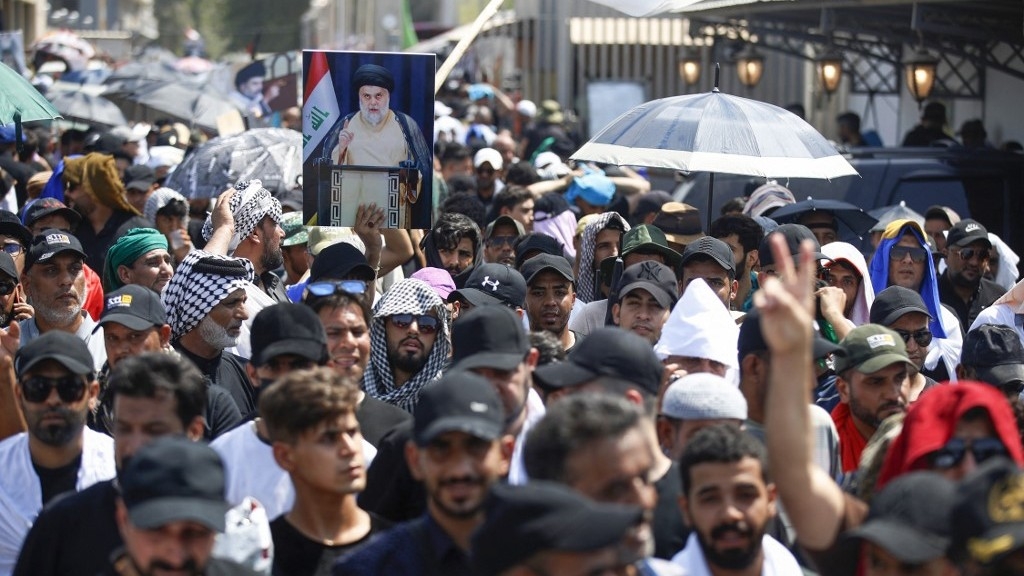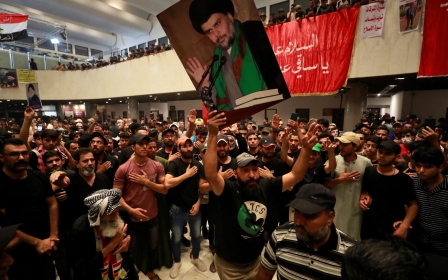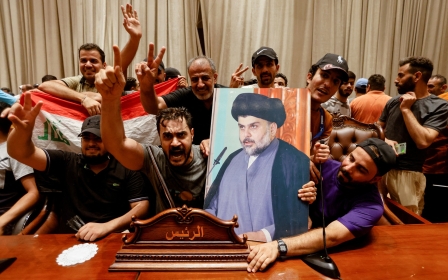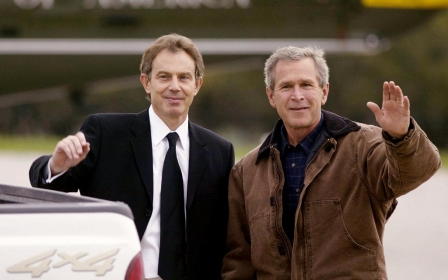Iraq: Sadr seeks early elections after 'very good' meeting with top UN envoy

Muqtada al-Sadr and Jeanine Hennis-Plasschaert, the secretary-general of the United Nations Assistance Mission for Iraq (Unami), met at the influential Shia cleric's residence in Najaf on Friday to discuss the country's political crisis.
Hennis-Plasschaert talked with Sadr about ways in which the differences between Iraq's political parties could be bridged, sources told Middle East Eye.
Neither side directly revealed what happened during the meeting, which lasted about two hours, but Hennis-Plasschaert told reporters on her departure that she had discussed with the cleric "the importance of finding a solution to the current political crisis," and that "the talks were very good".
The political process has been at an impasse since elections last October, with no new government formed in Iraq. Sadrist MPs, who make up the largest parliamentary group, withdrew from parliament in June, leaving the process in the hands of the Iran-backed Shia Coordination Framework.
'Plasschaert is a figure who is accepted by most of the conflicting parties as a neutral party. She is more a postman than a solution-maker'
- Shia political leader
Tensions between jostling political forces reached a climax last week after thousands of Sadr's followers stormed the fortified Green Zone in central Baghdad, occupied the parliament building and started an open sit-in inside and around the building.
New MEE newsletter: Jerusalem Dispatch
Sign up to get the latest insights and analysis on Israel-Palestine, alongside Turkey Unpacked and other MEE newsletters
On Wednesday, Sadr demanded the dissolution of parliament and the holding of early national parliamentary elections in which the old political forces - the current political parties - would not participate. He called on his followers not to end their sit-in until his demands were implemented.
Hennis-Plasschaert is the first non-Sadrist figure the cleric has agreed to meet since June. Sadr has, up to this point, refused to receive calls or visits from diplomats or leaders not allied to him, Sadrist leaders told MEE. Friday's meeting may mark the end of the political boycott Sadr has imposed on himself since June.
Hennis-Plasschaer's visit to Hananah, Sadr's home in Najaf, central Iraq, followed a series of meetings the UN official has held with Iraqi political leaders over the past few days.
On Thursday, Hennis-Plasschaert met Hadi al-Amiri, head of the Iran-backed Fatah parliamentary bloc and key leader of the Coordination Framework, Sadr's biggest opponent. A day earlier, she met Iraqi President Barham Salih.
The statements of the United Nations mission in Baghdad, which were issued in the wake of these meetings, said the UN envoy sought to persuade all parties to calm down and start comprehensive dialogues to dismantle the current crisis.
"Plasschaert is a figure who is accepted by most of the conflicting parties as a neutral party. She is more a postman than a solution-maker," a Shia political leader told MEE.
"We are in a real crisis - one whose course most of the leaders can't influence. What made the situation even worse was the absence of reasonable people and acceptable mediators. Plasschaert came in through this door."
Early elections - the main demand
Sadr emerged as the biggest winner in the October national parliamentary elections. His bloc took 73 seats, and he succeeded in forming the largest parliamentary bloc in alliance with Kurdish and Sunni forces. He was seeking to form a majority government that would exclude his Iran-backed opponents.
Since then, his opponents, who gathered under the umbrella of the Coordination Framework, have sought to form a power-sharing consensual government, as has been the political custom since 2003. This grouping has appealed to the Supreme Judicial Council in its mission to obstruct Sadr, while missile attacks have also disrupted the political process.
Sadr, one of the region's most inluential Shia clerics, ordered his deputies to resign from parliament and announced his political retirement in June in protest.
But he called on his followers to storm the Green Zone last week and prevent parliament from convening after the Coordination Framework's leaders announced their nomination of Mohammed Shia al-Sudani for prime minister. Sudani is close to Nouri al-Maliki, the former Iraqi prime minister and Sadr's arch-enemy.
Sadrist leaders had said the cleric was looking to change the political system and scrap the constitution, but on Wednesday Sadr lowered his declared demands, saying he wanted to dissolve parliament and hold early elections in order "to end corruption and banish the old existence, regardless of their affiliations... through a peaceful revolutionary democratic process".
Hadi al-Amiri, as well as parliamentary speaker Mohammed al-Halbousi - formerly a key Sadr ally - and a number of leaders of the Coordination Framework, welcomed Sadr's call for early elections. But they said that comprehensive dialogue needed to be governed by the constitution and the law, which politicians and observers believe has been a factor in getting Sadr to reduce his demands.
"Sadr's real problem is that his deputies left the parliament. He wants to find a settlement to compensate for his great losses represented by the resignation of his deputies," a prominent Shia leader familiar with the latest developments told MEE.
"He [Sadr] knows perfectly well that time is not on his side and that his losses are increasing. He will not allow them [his opponents] to form a government, so he is pressing for early elections as soon as possible to correct the current situation and start over."
Several Iraqi politicians involved in the current talks told MEE that "indirect and not serious" discussions between Sadr and Amiri had taken place over the past few days. They said potential solutions had been discussed, including holding national parliamentary elections at the earliest opportunity.
They had also discussed providing sufficient guarantees for Sadr - that they would not legislate any laws without his consent, or make any changes in executive positions that might affect his interests. Possible legal solutions for returning Sadr's deputies to parliament are also on the table.
'The problem lies in the details'
Leaders close to Sadr told MEE the cleric had not communicated directly with any party, but that he received many offers - indirectly - to "calm the situation and dismantle the crisis". They said Sadr had rejected all such offers, insisting on early elections under the current caretaker government.
"Early elections may be the solution, and it is an option that has become acceptable to most of the key actors in Iraq, including Iran and the US," a senior Iraqi official close to the outgoing Iraqi prime minister, Mustafa al-Kadhimi, told MEE.
"The problem lies in the details," the official said. "When will these elections take place? Who will organise it, who will supervise it? What is the fate of the current parliament? Will the elections be held according to the old electoral law or will there be a new law? What is the position of the political partners? How will the forces that fear amending the constitution, such as the Kurds and Sunnis, be reassured? Dozens of questions that need clear answers and prior agreements."
The official continued: "It is not possible to proceed with Sadr's calls without introductions. Even if we assume that Sadr will succeed by overcoming all these problems without dialogue or agreements, technically it is not possible to hold national parliamentary elections [in less than] a year.
"So, will Sadr be satisfied with that? And if he is satisfied, will his opponents and partners be satisfied?"
Middle East Eye delivers independent and unrivalled coverage and analysis of the Middle East, North Africa and beyond. To learn more about republishing this content and the associated fees, please fill out this form. More about MEE can be found here.




